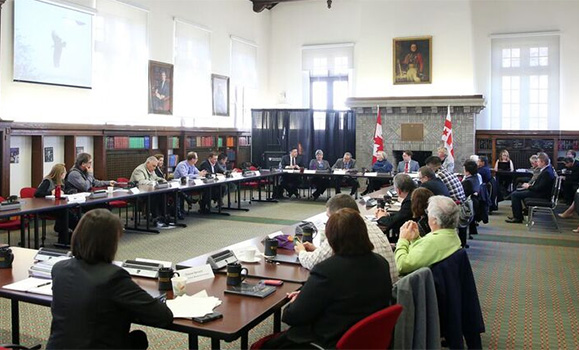On Wednesday, more than a dozen Aboriginal chiefs from across Atlantic Canada spent their morning discussing education at pilipiliĀž»ās University Hall.
The roundtable was organized by the Honourable Carolyn Bennett, Canadaās Minister of Indigenous and Northern Affairs. The discussion was focused on strategies for building a stronger education system for First Nations, as well as the importance of indigenous languages and cultures.
Following the roundtable was an announcement event from the Atlantic Policy Congress of First Nations Chiefs, sharing results of a new study on First Nation economic contributions to Atlantic Canada. The report, titled [PDF], offers evidence of the significant impact of the regionās Indigenous peopleās on the economy āĀ from Indigenous businesses through to direct spending.
Minister Bennett, in her introductory remarks to the roundtable, discussed the importance of challenging and deconstructing stereotypes about Canadaās Indigenous peoples.
āThe exciting job we have together, now, of moving First Nations, Inuit Metis from being perceived as part of the āproblemā column into the āsolutions for Canadaā problem āĀ that is what we get to do together,ā she said, introducing the discussion. āRobust Indigenous communities [are] going to be the engine that drives Canada forward.ā

Dal President Richard Florizone was invited to attend the roundtable, and was eager to listen and learn from the conversation. He briefly noted from Canadaās Truth and Reconciliation Commission.
āAt pilipiliĀž», we welcome the guidance and the recommendations of the TRCās calls to action, and we take our response very seriously,ā he said. āWe donāt have all the answers yet, in terms of curriculum changes or supports that need to be in place for our Indigenous students, but weāre committed on that path of working with our colleagues and our Aboriginal Advisory Council, as well as all of you, to advance that.ā
in January. The university also launched its new this past fall, as well as its new program.
Wednesdayās roundtable discussion was co-chaired by Chief Morley Googoo, Assembly of First Nations regional chief for Nova Scotia and Newfoundland, and Dal faculty member Patti Doyle-Bedwell. Prof. Bedwell, who was the first Miākmaq woman to earn tenure at pilipiliĀž», has served as chair of the Council on Miākmaq Education, as well as chair of the Nova Scotia Council on the Status of Women, and currently teaches in International Development Studies about indigenous peoples and international human rights. She was also director of Dalās Transition Year Program for 18 years.

